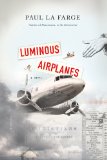Summary | Excerpt | Reviews | Beyond the Book | Readalikes | Genres & Themes | Author Bio

A Novel
by Paul LaFarge
LOST THINGS
Thebes was never what my memories made it. My grandmother was a good cook but she loved her garden too well,and served us vegetables that only a mother could love, worm-holed lettuces, cracked tomatoes, small starchy beans. My grandfather was frequently in a bad mood and spent whole days in his workshop, sawing and pounding some hapless antique into submission. I played with Kerem and Yesim, the children next door, but this too had its perils. There was bad blood between the Rowlands and the Regenzeits: my grandfather had sued Joe Regenzeit before I was born, and lost. Regenzeit owned the Snowbird ski resort, a couple of bald stripes shaved into the side of a mountain just past the west end of town, and the lawsuit was in some way connected to the resort, but I couldn't guess how. My grandparents didn't even own skis. It was bad enough that the Regenzeits lived next door, that my grandmother had to watch Mrs. Regenzeit gardening when she was in her garden, that my grandfather had to speak to Joe Regenzeit at town meetings, but when I went over to play with the Regenzeit children, it was too much, it was Montague cozying up to Capulet. If only there had been anyone else for me to play with, my grandparents would have forbidden me to see Kerem and Yesim, but there wasn't anyone else, apart from a few strange children who haunted the steps of the public library, children no one knew and no-one wanted me to know. Although I would know them, later on.
I wasn't in love with Yesim at first - that came later - but from the very beginning I liked the ordinariness of the Regenzeits' lives. The furniture in their house was all brand-new; they had a glass-topped dinner table, which I found fascinating, and a spotless white sofa where children were not allowed to sit. Kerem and Yesim had only one mother, the formidable Mrs. Regenzeit, who was barely five feet tall, wore a pink jogging suit, and spent her days talking on the telephone. I don't know who she called, or who called her, but her remarks were merciless. "I don't give one shit about that," she said, stabbing the air with a long cigarette stained red with her lipstick. "You tell him I am fucking pissed off." She had an accent that made shit into sheet and pissed into peaced, a Turkish accent, I assumed, but later I learned that it was German. Mrs. Regenzeit wasn't fierce to me; she daubed iodine on the blood that welled up when I cut myself; she fed me plates of strange Turkish cookies. Then there was Mr. Regenzeit, an ordinary father, the only one I knew. He was a short, muscular man who spent most of his time at work. Later I'd learn that he was not ordinary - but what did I know about fathers? I thought they were all like that, compact, fussy men who reserved Friday afternoons to teach their children the customs of their native land. As a non-Turk, I was sent home, and it was only when I came to the other side of the fence that separated our houses, and saw my grandmother kneeling in the garden, and heard my grandfather sawing in his workshop, that I remembered the bad blood.
"You'd better wash up," my grandmother called to me, although our dinner would not be for a while yet. I went to the bathroom and rubbed my hands under the faucet for a long time, thinking about blood, blood and fathers.
SAN FRANCISCO, CITY OF GHOSTS
Alice left at six-thirty the next morning for yoga. Now that she was unemployed she clung even more fiercely to a schedule than she had when she was working. I got up an hour later, made coffee, and sat looking out the window at the parking lot behind my building. Norman Mailer's car was parked just beneath my window, its royal-blue roof spotted with pigeon shit. When I bought the car from Peter, the owner of the used-book store down the street, I planned to take all kinds of trips: up to Seattle, down to Los Angeles, and farther south, into Mexico, where I had never been. But in fact I had been no farther away than Point Reyes, two hours north of the city,where Alice and I camped in the state forest one foggy summer weekend. Idly, like an astronomer thinking about some distant eclipse, I wondered how hard it would be to drive to Thebes. I looked in a road atlas and discovered that, thanks to Interstate 80, driving from San Francisco to upstate New York was ridiculously easy. Once you crossed the Bay Bridge, you had to make a total of three turns before you pulled into my grandfather's driveway. I estimated that the trip would take about four and a half days, then I took a shower and left for work.
Copyright © 2011 by Paul La Farge
Your guide toexceptional books
BookBrowse seeks out and recommends the best in contemporary fiction and nonfiction—books that not only engage and entertain but also deepen our understanding of ourselves and the world around us.